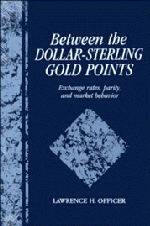Book contents
- Frontmatter
- Contents
- List of figures
- List of tables
- Preface
- List of symbols
- 1 Introduction
- Part I Monetary standards
- Part II Exchange rate
- Part III Gold points
- Part IV External and internal integration
- Part V Market efficiency
- 12 Theory of market efficiency
- 13 Empirical testing of market efficiency
- Part VI Regime efficiency
- Part VII Conclusions
- Notes
- References
- Index
13 - Empirical testing of market efficiency
Published online by Cambridge University Press: 13 October 2009
- Frontmatter
- Contents
- List of figures
- List of tables
- Preface
- List of symbols
- 1 Introduction
- Part I Monetary standards
- Part II Exchange rate
- Part III Gold points
- Part IV External and internal integration
- Part V Market efficiency
- 12 Theory of market efficiency
- 13 Empirical testing of market efficiency
- Part VI Regime efficiency
- Part VII Conclusions
- Notes
- References
- Index
Summary
Unit of observation
A perfectly efficient operation involves the pertinent exchange rate always within the efficiency band of that operation. Perfectly efficient gold-point arbitrage (GPA) requires absolute confidence in the maintenance of the gold standard over the time needed for the operation to be completed, specifically, in being able to transact in gold with both authorities. In turn, perfectly efficient uncovered interest arbitrage (UIA) and forward speculation (FS) (and in fact the applicability of the UIA, FS model) require full confidence in perfectly efficient GPA over the agent's horizon. Covered interest arbitrage (CIA) has no such condition for its efficiency, because that operation behaves the same way under a gold standard as under a flexible exchange-rate system.
For perfect efficiency, (1) perfect knowledge of the relevant parameters in the efficiency band (or, equivalently, in the associated profit formulas) and (2) instantaneous adjustment are also needed. Otherwise, only what may be called general efficiency – but not perfect efficiency – is attainable. General efficiency incorporates “inefficiencies” (violations of efficiency points) that are of small magnitude and non-persistent.
To test for the market efficiency of GPA, UIA, CIA, and FS, monthly data are used. So efficiency is tested only in the general sense. This means that measured efficiency is consistent with inefficiencies in the form of intra-month profit opportunities that average out for the month.
- Type
- Chapter
- Information
- Between the Dollar-Sterling Gold PointsExchange Rates, Parity and Market Behavior, pp. 230 - 252Publisher: Cambridge University PressPrint publication year: 1996

